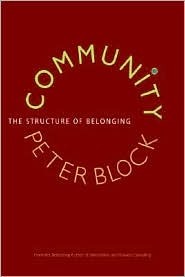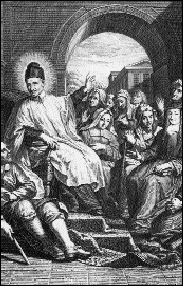Vincent and Peter Block:
Building Empowerment and Stewardship
Through Community
.
Peter Block is an author, consultant and partner in Designed Learning, a training company that focuses on building empowerment, stewardship, accountability, and reconciliation within communities. His early books include The Empowered Manager, Stewardship: Choosing Service over Self-Interest and Flawless Consulting: A Guide to Getting Your Expertise Used.
 In his 2008 book, Community: The Structure of Belonging, Block identifies isolation as a major malady of our time. To solve it, he suggests reweaving our social fabric, creating communities marked by connectedness and caring for the whole. He argues that to help empower others and build community, we must re-think why and how we come together for conversations.
In his 2008 book, Community: The Structure of Belonging, Block identifies isolation as a major malady of our time. To solve it, he suggests reweaving our social fabric, creating communities marked by connectedness and caring for the whole. He argues that to help empower others and build community, we must re-think why and how we come together for conversations.
To achieve this new experience of community, Block says we need to shift our conversations from the problems of community to the possibility of community. This change in focus is what will allow us, says Block, to create a future remarkably and necessarily different from our past.
To create this shift, Block suggests changing the way we enter into conversations, primarily through the kinds of questions we ask and address in those conversations. Many Vincentians will know that Vincent de Paul created community in response to the question: “What must be done?”
Questions Are More Transforming Than Answers
Block suggests a switch in how we approach questions within our groups, whether they number 5 or 100. He says traditional conversations seek to explain, study, analyze, or define, and often focus on a desire to change others. Such questions, says Block, often fail to move the group to any new place because they get asked and answered in the same context. As Block notes, “They call us to try harder at what we have been doing.”
Questions that open the door to a new future need to be different. Block describes them as “ambiguous, personal, and stressful.” The right kind of questions, he says, need to engage people intimately, and invite responsibility through a response, even if that reply is to admit having no response. He also recommends replacing advice with curiosity.
Block suggests that we make a shift through conversations that move us in the following directions:
- From conversations about problems to ones of possibility
- From conversations about fear and fault to ones of gifts, generosity, and abundance
- From seeing the corporation and systems as central to seeing associational life as central
- From a focus on leaders to a focus on citizens.
Block offers a list of questions with little power to transform. Here are a few samples:
How do we get people to show up and be committed?
How do we get others to be more responsible?
How do we get people to do the right thing?
How do we get others to buy into our vision?
Block also offers suggestions for questions that will make a difference. Here are a few:
What is the crossroads we are faced with at this time?
How valuable an experience do we want this event to be?
To what extent are you invested in the well-being of the whole?
What have I done to contribute to the very thing I complain about or want to change?
What forgiveness are you withholding?
The Power of Small Groups
Block bases his focus on small group process on the following assumptions:
- Social fabric is created one room at a time, the one we are in at the moment.
- It is formed out of the questions “Whom do we want in the room?” and “What is the new conversation that we want to occur?”
- The small group is the unit of transformation and the container for the experience of belonging.
For Block, each small group is a unit for social transformation. Block suggests that each gathering needs to become an example of the future we want to create.
Asking Questions Also Key to Vincentian Method
We found, with a little research, that Block’s focus on inspiring new directions through asking the right questions is very Vincentian. Louise Sullivan, DC, in her book The Core Values of Vincentian Education, notes that Vincent developed a new methodology for teaching based on asking questions in his attempt to prepare competent parish priests in the 1660’s. “The question-answer approach – the only one Vincent would allow – replaced the lecture and dictation of notes. By the active participation of the students, he sought to insure their clear understanding as well as their mastery of the material taught” (166).
According to Louise, Vincent also would have agreed with Block’s emphasis on small groups. “The method of instruction broke with tradition. There were certainlyconferences, but the workshop format of small groups was widely used” (163).
DePaul University’s Scott Kelley remarks on the importance of what often now is referred to as “The Vincentian Question” to the ministry of Vincent de Paul and those who follow in his footsteps. As Kelley writes, “St. Vincent’s vocation and therefore the Vincentian age emerged in January 1617 when Madame de Gondi turned to Vincent de Paul and asked, “What must be done?”
![]() Vincent’s response to “What must be done?” began with the creation of cohesive small groups of volunteers. These volunteer groups were based in Catholic parishes, and known as the Confraternities of Charity. Vincent also had a remarkable insight into the importance of meetings. During a presentation to the Ladies of Charity dated around 1638 he called the importance of meetings “obvious” as “Our Lord recommends them and promises to be in their midst. ‘Where two or three are gathered,’ etc. And in another place: ‘If two or three join their voices, I will give them whatever they ask.'” For Vincent, meetings that dealt with the service of the poor were holy time, a pre-eminent occasion for touching the presence of God and doing God’s work.
Vincent’s response to “What must be done?” began with the creation of cohesive small groups of volunteers. These volunteer groups were based in Catholic parishes, and known as the Confraternities of Charity. Vincent also had a remarkable insight into the importance of meetings. During a presentation to the Ladies of Charity dated around 1638 he called the importance of meetings “obvious” as “Our Lord recommends them and promises to be in their midst. ‘Where two or three are gathered,’ etc. And in another place: ‘If two or three join their voices, I will give them whatever they ask.'” For Vincent, meetings that dealt with the service of the poor were holy time, a pre-eminent occasion for touching the presence of God and doing God’s work.
Adamson University President Gregg Banaga has written on the importance of Vincentian dialogue and inclusion. “The Vincentian approach leans toward the discovery of knowledge by dialogue with grassroots and marginalized people,” writes Banaga in an article entitled, “Education with a Heart” in the Vincentian Heritage Journal. “Vincent de Paul’s genius lay in his ability to share his vision and inspire a wide spectrum of people to get involved in his work.”
As Vincentian’s we continue to come together to consider “What must be done?” In doing so, we can rely on the advice of practitioners like Peter Block to help us make those dialogue sessions more fruitful.
What God has done for us in the past is so great
that we can look to the future with hope and confidence.
– Vincent de Paul
Reflection Questions
What is most challenging for you in Block’s insights on asking new questions?
How has the Vincentian question guided your decisions and actions?
Vincent thought of meetings as “holy time.” How might you help create a more creative, transformative environment within meetings that you lead?
Resources
Kelley, Scott. White Paper on Sustainability at DePaulUniversity, August 31, 2009, http://works.bepress.com/scott_kelley/11. Used with permission.
Sullivan, Louise D.C. (1995) “The Core Values of Vincentian Education,” Vincentian Heritage Journal: Vol. 16: Iss. 2, Article 3. 163-166. Available at: http://via.library.depaul.edu/vhj/vol16/iss2/3
Edited by Patricia M. Bombard, BVM, D.Min., Director, Vincent on Leadership: The Hay Project, DePaul University, Chicago, IL USA



